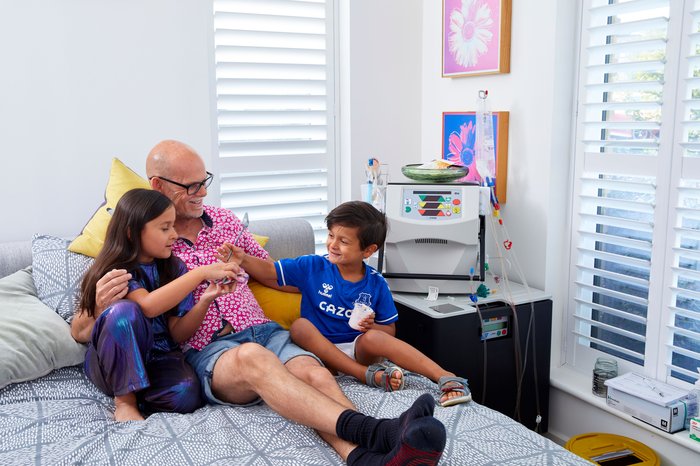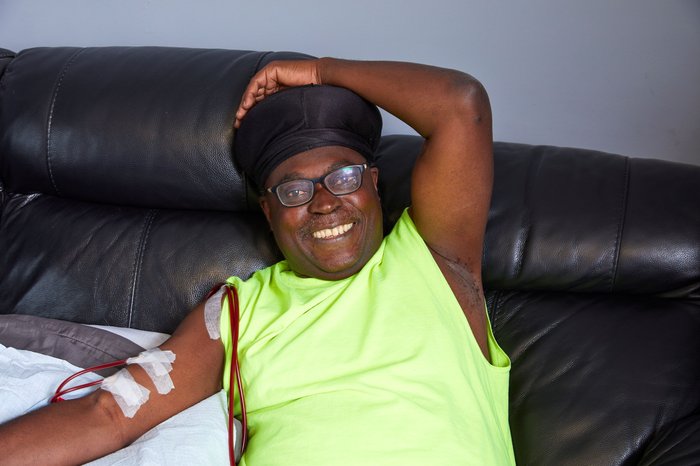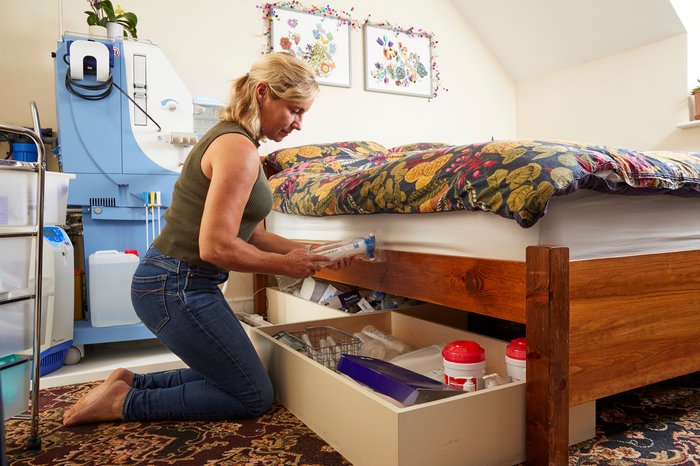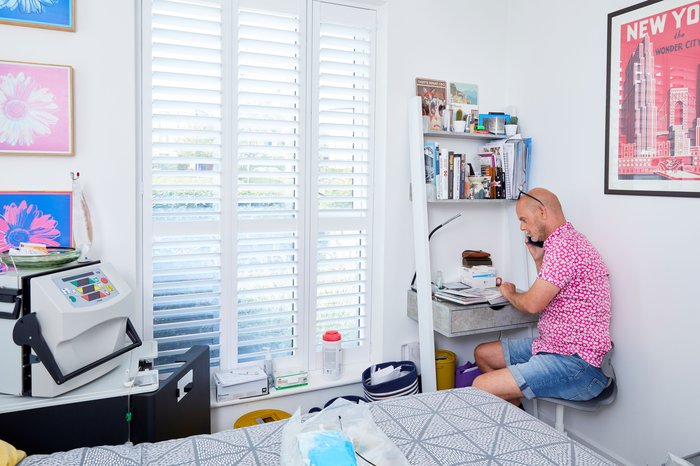Haemodialysis (HD) is a treatment for kidney failure. When your kidneys don’t work properly, they can’t clean your blood, so toxins build up in your bloodstream.
Your kidneys also make less urine so excess fluid and waste products remain in the body. Haemodialysis ‘cleans’ your blood by running it through a dialysis machine filter to remove toxins and excess fluid. The clean blood is then returned to your body and the dialysis fluid is thrown away.

How often will I need to have HD?
Most people have haemodialysis three times a week, with each session lasting around four hours. You may need more or less haemodialysis than this. Your healthcare team will discuss the right treatment schedule for you.
What is home HD?
Home HD is when your dialysis treatment takes place in your own home rather than in a hospital or dialysis unit. You can carry out the dialysis yourself or with the support of a family member, friend or carer who has been trained to help you.
Who can have home HD?
Most people with a stable kidney function who are receiving HD are suitable for home HD. You will need to be able to learn how to set up and use the dialysis machine, either by yourself or with the help of a family member, friend or carer.
Talk to your healthcare team if you are interested in home HD. They will discuss what is involved to see if it is a suitable option for you and your home.

Do I have to have home HD?
No. It is entirely your choice. You can have dialysis at home, in hospital or in a local satellite unit.
What equipment do I need for home HD?
Your hospital should provide and install the dialysis machine and all the equipment you need for home HD free of charge. There are different types of home HD machine and your dialysis team will assess which is the best one for you to have. It may be similar to the machines used in the hospital or it could be a smaller machine which could fit by the side of the bed.
Your dialysis team will explain the space requirements in detail. You will need a dedicated clean area, ideally next to a room with running water such as a kitchen or bathroom. Depending on the model of dialysis machine you use, you may be able to dialyse without a mains water connection, or new pipes may need to be put in - one to deliver running water to your dialysis machine and one to remove the waste water.
The room will also need plug sockets and you will need enough space to store the supplies, including the dialysis fluid, filters, bags of saline, needles and cleaning products. Most people need storage about the size of a double wardrobe for their dialysis supplies. These need to be kept in a dry area away from damp or direct heat. A member of your kidney team will visit your home to discuss these arrangements before you start home HD.
The dialysis supplies will be delivered directly to your house, usually on a monthly basis although other arrangements can be discussed with you if you have limited storage space. The delivery driver will move the supplies to your chosen storage area and stack them for you.

Is training available?
You will receive full training before you start home HD. Some people on home HD are supported by a family member, friend or carer who will also receive full training.
You will be shown exactly what to do and how all of the equipment works. The initial training will take place at your dialysis unit or at a dedicated training centre. This usually takes between 4 to 12 weeks. A date will then be agreed for you to start home HD.
Everyone learns differently. You will not have to perform home HD by yourself until you and your kidney team are completely confident that you are ready.
Is there any financial help available?
You may be able to receive financial support towards the cost of the water and electricity that are needed for home HD. You may also be able to apply for a reduction in council tax and your family member, friend or carer may be eligible for financial support if they help look after you.
See our page on home dialysis reimbursement for more information and our information on welfare benefits and financial support.
Will I still need to go to the hospital?
You will normally only need to go to hospital for dialysis if your HD machine breaks down and you don’t receive a replacement in time or if you or the person who supports you to have home HD are unable to perform your dialysis. You may also still need to go to the hospital for occasional blood tests and to see your kidney team.
To understand more about how home HD could benefit you, visit this page to hear from home HD patients Nick and Maddy.
What are the benefits of home HD?
Home HD may be the right choice for you if it suits how you would like to live your life and manage your kidney disease.
- Having dialysis at home gives you more flexibility than hospital-based sessions. You may be able to change your dialysis schedule to suit your lifestyle rather than relying on set time slots and transport for hospital appointments.
- You will be able to have your treatment in an environment which is familiar to you, and you can avoid frequent hospital visits.
- In consultation with your kidney team, you may choose to have more dialysis than you would receive in hospital. This can improve your general wellbeing and symptoms such as tiredness and itching.
- Learning how to manage your own treatment can make you more confident about haemodialysis. This can help you to manage your kidney disease more effectively and to make choices about your treatment that are right for you.
Are there any drawbacks with home HD?
Most people on home HD manage very well with support from their kidney unit. However, there may be times when you need to temporarily stop home HD for personal or medical reasons. When this happens, you will receive dialysis back in hospital or in a specialist unit.
It is important that you keep enough dialysis supplies in stock (at least a week’s worth) in case of any emergency such as bad weather. You should tell your electricity, gas (heating) and water companies that you are on home HD so that they can treat you as a priority in case of any supply issues. See our page on the Priority Services Register for more information.
If you are used to receiving dialysis in hospital or in a specialist unit you may find that you miss the companionship of other patients if you move to home HD.
You will need to be confident in managing your own care, including needling, in order to have home HD.
Remember that it is your choice and you will not be put under any pressure to start home HD if you do not feel that it is right for you. You are free to move back to hospital care at any time if home HD doesn’t work for you.

I’m not sure how I feel about home HD. Are there any other options?
If you want to take more control of your care but are unsure about home HD, talk to your kidney team about shared haemodialysis care. This gives you the opportunity to take part in any aspect of your dialysis treatment in hospital, with guidance and support from nursing staff. You can choose which aspects of your care you would like to manage. This can range from small tasks, such as taking your own blood pressure and weight, to any (or all) of the other dialysis tasks. The emphasis is on taking part and feeling involved at a level that suits you as an individual.
For more information see our leaflet on Shared haemodialysis care.
Where can I find out more information?
Talk to your dialysis team if you would like more information on home HD. They can explain the training and exact requirements based on your specific situation. They may also be able to put you in touch with a current home HD patient so you can discuss how it works for them. Other sources of information include:
- Kidney Care UK Patient Support & Advocacy Service
- Kidney Care UK Benefits information
- NHS Dialysis

Publication date: 10/2024
Review date: 10/2027